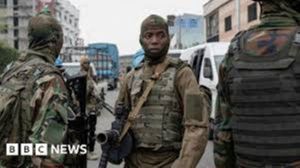Statesman -- Checks conducted nationwide have revealed that the strike actions embarked upon by the junior doctors and the Health Workers’ Group in the last two months have cost the lives of at least sixty three people, with the case of the Korle-Bu Teaching Hospital still under investigation by The Statesman.
Conservative estimates indicate that, in the Ashanti Region alone, 43 of those patients on admission later died due to lack of proper care. Checks further revealed that a majority of those who died were diabetic or stroke patients who needed close and constant monitoring. Unfortunately, they couldn’t have the benefit of those essential and specialised monitoring services from their designated health workers, resulting in their death from complications.
Pain-staking checks undertaken in the Eastern Region also indicate that 20 avoidable deaths were recorded as a result of the strike action during the same period. Only few para-medical staff were observed attending to emergency cases in government health facilities in the region.
Our Editor-in-Chief personally witnessed a newly-born baby who had brain damage because her impoverished mother overstayed her labour at home, afraid to check into a private hospital early because of the high fees. The unfortunate child was starved of vital oxygen as a result.
In the Ashanti Region, some patients on admission were prematurely discharged due to the heavy workload on the few doctors and nurses who volunteered to work, in the true spirit of the Hippocratic oath, which says in part “I will prescribe regimens for the good of my patients according to my ability and my judgment and never do harm to anyone.” Indeed, primum non nocere, “First, do no harm,” is considered as absolutely crucial to the profession, so much so that in other countries, such as the months-old ongoing strike action in Germany, the health workers there limit it to a day or so in the week, but never leaving any department or ward totally empty of care.
But, not so, what happened here in Ghana last month. At the Komfo Anokye Hospital, seven hundred patients were on admission at the various wards at the time of the strike action. 657 were prematurely discharged, leaving 143. Hospitals at Worawora, Jasikan and Hohoe in the Volta Region were completely closed down as a result of the strike action. All patients on admission at Hohoe hospital were discharged on June 15, 2006. In Krachi West District, however, the Medical Doctor in charge arranged with some senior nurses to take care of the in-patients and also handle emergency cases.
At Agona Swedru District Hospital, all in-patients were discharged on June15, 2006, and the hospital closed down.
Meanwhile, further reports received by the paper revealed that most mortuaries were in operation during the strike action. There were no reports of difficulties as regards releasing of corpses to bereaved families. It was as if, the dead received more care than the living.
However, at the Central Hospital in Koforidua, corpses brought from homes and other funeral homes were rejected and not given due treatment. Mortuary attendants at KATH who initially joined the strike action were prevailed upon by the hospital administration to withdraw their support to the strike action. They obliged and went back to their watchman’s role in ensuring the dead slept soundly; whilst the sick wailed in careless pain.
The dead included Dominic Tuffuor, a staff of the Waste Management Department of the Kumasi Metropolitan Assembly and the mother of the Director of Bleumich Company in Kumasi, whose name was not readily available. Both died on June 9, 2006, when they suddenly took ill and had to be rushed to the KATH. They died hours later because there were no doctors or nurses to attend to them.
General News of Tuesday, 18 July 2006
Source: Statesman
















